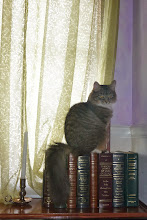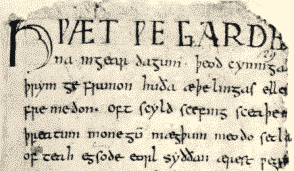A kenning, for those unfamiliar with Old English, is a compressed metaphor or circumlocution of a noun, in which an object is described in a phrase often consisting of two hyphenated words, i.e. "whale-road" = sea. Some of them are really beautiful and interesting ways of describing things. You see them in Anglo-Saxon and Norse poetry especially.
For clarity: Old English (pre-1066) is the stuff Beowulf is written in, eg. Hwaet! We gardena in gear-dagum (Hark! We have heard of the spear-Danes of old). Chaucer (c. 1343-1400) wrote in Middle English, eg. Whan that Aprill with his shoures soote/the droghte of March hath perced to the roote (When April with his sweet showers has pierced the drought of March to the root).
Memory tool: Middle English = kinda sorta readable. Old English = WTF?
There aren't a lot of kennings in Middle English, but they're all over the place in Old English.
Examples:
Sea........................Whale-road, swan-road
Blood....................Slaughter-dew, battle-sweat
King......................Giver of rings
Bride/Wife...........Peace-weaver
Corpse..................Raven-harvest
Gold or Amber....Freya's tears
Raven...................Blood-swan
Snake...................Valley-trout
Sword...................Blood-worm, blood-icicle, onion of war (I don't get it either)
Today, while researching some primary sources on early medieval coronation rituals, I came across a new favorite:
"Widsith spoke, unlocked his word-hoard"
Word-hoard. It's a keeper.
P.S. I visited Cambridge this weekend, but as I have quite the word-hoard and image-hoard to share about it, it will have to wait a bit.
Word-hoard. It's a keeper.
P.S. I visited Cambridge this weekend, but as I have quite the word-hoard and image-hoard to share about it, it will have to wait a bit.



I'm waiting with "worm on tongue" (baited breath).
ReplyDeleteWord-hoard. I love it. Let's use kennings in our day to day life. Anon, Merlin!
ReplyDelete